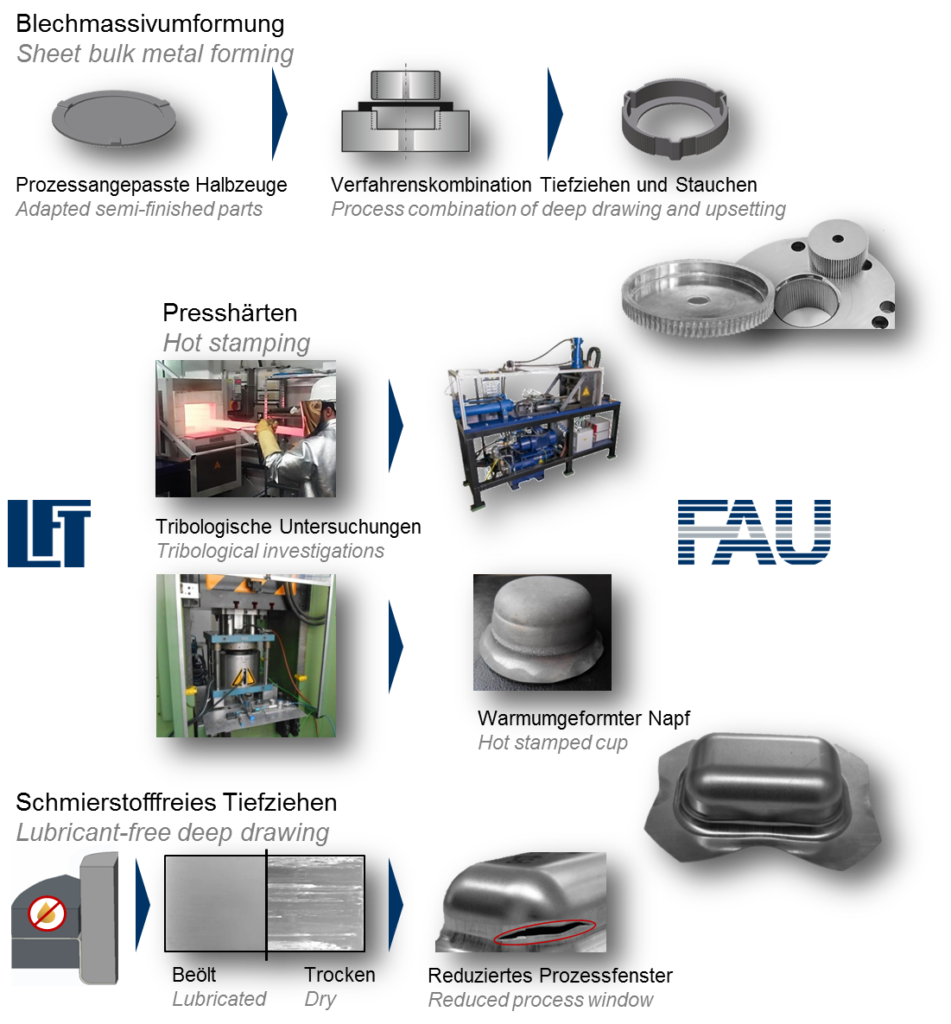Numerical Simulation of Metal Forming Processes

Numerical Simulation of Metal Forming Processes
1.) Numerical simulations of hydroforming for improving formability and productivity of automotive components.
2.) Modelling of severe plastic deformation processes for development of high strength fine grained sheet materials and their characterization.
3.) Formability prediction of lightweight materials like aluminium and magnesium alloys in warm working temperature range through finite element simulations.
Weight reduction while maintaining functional requirements is one of the major goals of engineering design and manufacturing, so that materials, energy, and cost are saved while reducing environmental damage. Advanced grades of steel, such as ultra-low carbon interstitial free steels and ultra-high-strength steels have been developed and are being used for critical automotive components. Lightweight materials, such as aluminum (Al) alloys offer great potential to reduce vehicle weight in the auto industry by replacing the most commonly used materials, i.e. different grades of steel, because of their high strength to weight ratio, thermal properties, excellent corrosion resistance, and easy machinability. Improvement in mechanical properties of aluminum alloys by alloying and heat treatment increased the application areas of these alloys in the automotive and aerospace industries. Despite the huge potential of aluminum alloys for weight reduction and fuel savings, the justification for replacing steel with aluminum alloys is still questionable with conventional production processes because of high material cost and formability limitations. Therefore, advanced forming methods are needed to improve their formability. Hydroforming, tailor welded blanks, warm forming, and severe plastic deformation processes (such as cryorolling, accumulated roll bonding, and constrained groove pressing) are some of the advanced forming techniques which are of great interest today.
For the project “Numerical Simulation of Advanced Metal Forming Processes”, the following scientific program has been defined:
• Numerical simulations and experimental investigations in the area of advanced metal forming will be conducted. It’s expected that advanced forming techniques will enable increased usage of lightweight materials like aluminum in the automotive industry.
• Simulations using the finite element method and experimental investigations on advanced metal forming processes, such as hydroforming aimed at improving room temperature formability of aluminum alloys will be carried out.
• Different combinations of sheet and tube hydroforming processes will be investigated.
• Warm forming processes such as stretch forming and deep drawing will be carried out on automotive-grade aluminum alloys and will be simulated to predict an accurate failure criterion.
• Studying the severe plastic deformation process (SPD) to produce ultra-fine grain materials with increased toughness. Processes such as accumulated roll bonding, cryo-rolling, and constrained groove pressing will be studied using both aluminum and steel sheets. Process modifications to suit the functional requirement of specific applications will be studied for the SPD processes. The microstructure and mechanical behavior of the processed sheets will be characterized.
• Finite element simulations will be performed for the above advanced forming processes using software such as LS-DYNA and Abaqus. The simulations are aimed at understanding the fundamental mechanics of the forming process and to optimize the process parameters.
• An automated optical strain measurement system will be used to measure the surface strains on the formed components to validate and correlate with the finite element simulations.
The following outcomes are expected:
• Establishing process modeling of hydroforming and determination of optimal process parameters.
• Establishing numerical prediction and development of failure criteria for warm forming of sheets.
• Achieving a formability improvement of ultra-fine grained automotive-grade aluminum alloys produced through Severe Plastic Deformation by process modification and modeling.
see also: Resources
